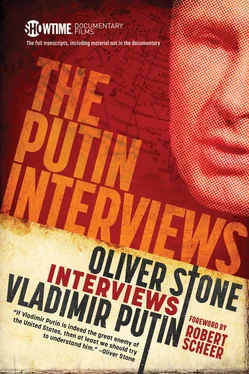OS:But Snowden is describing a situation where they’re basically doing cyber attacks on China. This is in 2009/’08, in that era. I would imagine he never knew about the Russian side of the cyber equation, but I would imagine Russia is having an ongoing battle with the United States. An ongoing battle, secret battle, with cyber warfare. I would just imagine that. I would imagine the United States is trying to do things to Russia. And Russia was trying to defend itself and do things to the United States. I would just imagine that as practical—I’m not making it up. That seems to me obvious.
VP:Maybe when there is an action there is always a counter action.
OS:You’re acting funny about this story, like a fox that just got out of the hen house. [laughter]
VP:There were no hens in the hen house, unfortunately.
OS:A few weeks ago on RT, I saw a report—it was not followed up on, it disappeared after a day or two, but in that report, 20-plus countries were reported as being part of a Botnet attack on the banking system in Russia—six major banks. [171] Background Information: Although Oliver Stone mentioned six major banks being attacked, sources note that five Russian banks underwent a Botnet attack. See, “5 major Russian banks repel massive DDoS attack” RTNews (November 10, 2016). Retrieved at: https://www.rt.com/news/366172-russian-banks-ddos-attack/
I saw the RT report. This seems to be of such a magnitude that it points to a possible US attack—this was after the election. It points to a possible US attack on Russia’s banking system, which would make sense to me. But because the story disappeared, I’m sure that you’re aware of it, but what happened to that story, if it was true?
VP:No, the story didn’t disappear. Indeed, there were reports that such an attack was being prepared. We were not 100 percent sure that this was going to happen, but just to be on the safe side, the banking community, they addressed the media. And they informed their clients, the citizens, that such attacks were possible, they were imminent. And they called on the citizens not to get nervous, not to get confused, not to rush to the banks to get their money, from their deposits. They said they had everything under control. There were no grounds to be anxious and they wanted people to know that if this were to happen, then they should know that it was a hacking attack in order to destabilize the financial system of Russia. We are not claiming that the US is to blame for that. We do not have evidence to support that claim.
OS:Right. It’s a gigantic piece of business. I mean, you have Mr. Biden, first of all, saying, “We will attack Russia in the same manner as they attacked us in this election.” [172] Claim: “We will attack Russia in the same manner as they attacked us in this election.” Supporting: When asked whether the US was preparing to send a message to Russia for interfering in the US elections, Vice President Joe Biden replied: “We’re sending a message… We have the capacity to do it… He’ll know it… And under the circumstances that have the greatest impact.” See, “Biden Hints at US Response to Russia for Cyberattacks,” David E. Sanger, the New York Times (October 15, 2016). Retrieved at: https://www.nytimes.com/2016/10/16/us/politics/biden-hints-at-us-response-to-cyberattacks-blamed-on-russia.html
We will attack Russia in the same manner, at the time of our choosing”—something of that nature. And Mr. Obama seconded that and said that we will respond to the election hack or whatever he called it—the attack. This is an outrageous conversation. But those are big words from the vice president and then from the president. They’re serious people. So something happened before Inauguration Day.
VP:Certainly there is nothing good about that when such claims come from such a high level. Indeed you’re right, it was said that it would happen “at a time of their choosing.” There were two reasons. First, they wanted to challenge the outcome of the elections. They said a time of their choosing, but certainly the administration back then didn’t have any time left. To be honest, I do not want to offend or insult anyone, but what we’ve seen happen in recent days, it reminds me of what the Politburo of the Communist Party of the Soviet Union was doing at the beginning, especially when they awarded orders to each other. That was very funny.
OS:I don’t understand the analogy.
VP:We’ve seen President Obama give an award to his vice president. Yes he gave him some kind of a medal, and it reminded me of the members of the Politburo of the Communist Party of the Soviet Union. They gave orders and stars and medals to one another. So back then I understood that the administration had run out of time for any serious decisions.
OS:Well, you’re making light of it but in view of how much money we have invested in cyber warfare and our cyber command, it seems like a serious threat to me. I have the feeling that you’re playing it down because something did happen and you don’t want to reveal it because of sensitive relations.
VP:You are disappointed because the US failed to do something? Or do you just regret the money of the American taxpayers that has been spent on that cyber warfare?
OS:No, I believe that cyber warfare can lead to a hot war. I really believe that because of the past. You know, the Stuxnet virus came very close to creating chaos in the world. I think this is very dangerous, very dangerous, and I think we’re playing with fire.
VP:That is very dangerous.
OS:I know. Well, you’re obviously sitting on some information and you may not want to make it public.
VP:Yes. That’s a great secret. Top secret.
OS:[laughter] I know. But are we going to be able to handle the capabilities of this? It seems to me that what happened in Iran could be as serious in its way as what happened in 1945 at Nagasaki and Hiroshima. That was the beginning of a new age.
VP:The weapons used at Hiroshima and Nagasaki, it opened a tragic page in the history of humanity, because they released a terrible genie from the bottle. Our military specialists believe that there was no military sense behind using nuclear, atomic weapons against Japan which had already been put to rout. But I think this comparison between Stuxnet and the nuclear weapons is too overreaching. But should we fail to agree on a certain code of conduct in this field, and I agree with you on that one, the consequences of this spiral of action, they can be very grave and even tragic.
OS:It seems to me a secret war, but no one knows who started it. No one knows if it was a proxy country, if it was North Korea that hacked Sony—you know, these rumors go around. But if all the lights go out in Russia, and let’s say some of the grid in Russia were to close down overnight, there would be tremendous fear in Russia, as there would be the United States and people wouldn’t know who did it. Secret War.
VP:It is almost impossible to sow fear among the Russian citizens.
OS:[laughter] Ohhh!
VP:That is the first thing I wanted to say. And secondly, the economies that are more sophisticated, in technological terms, they are more vulnerable to this types of attacks. But in any case, this is a very dangerous trend. A very dangerous avenue to pursue for competition in and we need some rules to be guide us all.
OS:A treaty.
VP:I don’t want to say that, but you are simply drawing this information from me. You make me say that. One and a half years ago, in autumn 2015, we came up with a proposal that was submitted to our American counterparts. We suggested that we should work these issues through and arrive at a treaty, an agreement on the rules to be followed in this field. We came up with a similar proposal at the United Nations. The Americans didn’t respond, they kept silent, they didn’t give us any reply. Only at the very end of the Obama administration, the State Department, we called and they said they were willing to get back to talking about this matter. Our Foreign Ministry said that we would have to talk to the new administration because there was no time left. And this is one of the very important topics that we’re going to have to explore in the near future.
Читать дальше












